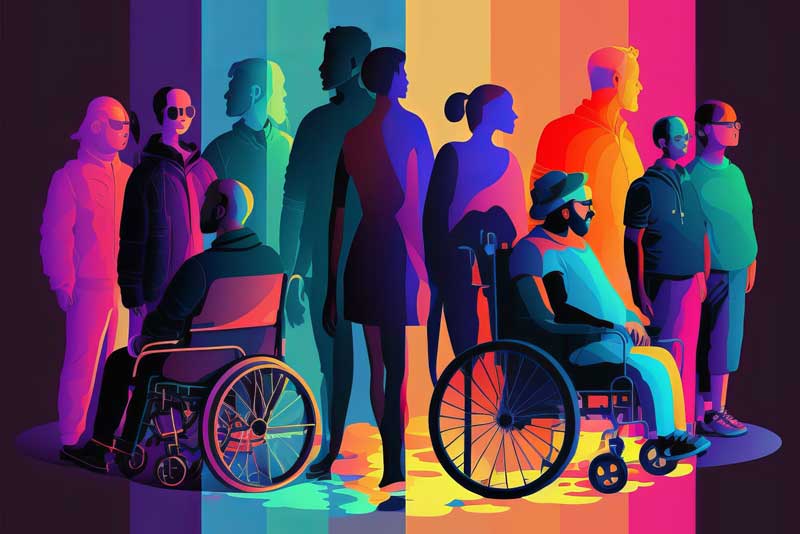Over the past few years, many companies have come to recognize the need to address long-standing issues of racism, sexism, homophobia, and other forms of discrimination present in the workplace. However, the wine and spirits industry has been lagging in this area, and it’s time to evaluate why that is, and what can be done about it.
The importance of DEI
Before we dive into the current state of DEI in the industry, let’s define what exactly we mean by each term:
- Diversity refers to the range of differences that exist within a group, such as race, gender, sexual orientation, and ability.
- Equity refers to justice and fairness, and entails acknowledging and addressing current imbalances.
- Inclusion means ensuring that everyone feels respected and welcome, regardless of background.
DEI isn’t just a new industry buzzword—it holds serious implications for both individual businesses and the industry as a whole.
Reflecting the customer demographic
DEI isn’t just important because it’s morally right—it also impacts your bottom line. The wine and spirits market consists of consumers from a variety of backgrounds, and customers want to see themselves reflected in the brands they purchase from. However, companies lacking diverse workforces often fail to fully understand the needs and desires of these customers. In turn, this lack of understanding often translates directly to lost sales opportunities.
Attracting talent
A diverse and inclusive workplace is crucial for attracting and maintaining talent. By creating an environment where everyone feels welcome and respected, companies significantly expand the pool of candidates they can choose from. Additionally, a company that prioritizes DEI initiatives is much less likely to lose valuable staff to their competitors who might otherwise present a more inviting work environment.

It’s the right thing to do
Businesses have a responsibility to create a safe and respectful workplace for all employees, regardless of who they are or where they come from. By failing to advocate for and protect their employees, companies risk exposing their staff to discrimination and harassment. Any business that genuinely cares for the wellbeing of its employees needs to ensure that its culture reflects that.
Barriers to DEI
Unfortunately, despite increasing recognition of the importance of DEI initiatives, many barriers to progress remain. According to a 2022 report from Deloitte and The Women of the Vine & Spirits, only 10% of women feel that the industry has made significant change in its attitude towards female employees over the past five years.
Until businesses take the proper steps to address and overcome these hurdles, the industry will continue to struggle to enact meaningful change.

Lack of diversity in leadership
One of the most significant barriers to DEI in the alcohol industry is the lack of diversity in leadership positions. According to research from Pronghorn, black Americans make up 12% of all alcohol consumers, yet only account for just 7.8% of the industry’s workforce, and a mere 2% of executive leadership. Without diverse leadership, it’s challenging to create an inclusive environment across the remainder of the organization.
Traditional industry culture
The wine and spirits industry is a deep-rooted one, with businesses often passed down from one generation to the next. Unfortunately, this has resulted in a traditional culture that can be slow to adapt. This mindset, coupled with the fact that many of these companies have been around for decades, can make it challenging to incorporate new ideas and perspectives.
Recruiting and retention challenges
As many businesses know, recruiting and retaining diverse talent can be challenging within the industry. A lack of diversity and inclusivity may deter potential talent from underrepresented groups, exasperating an already severe labor shortage. Additionally, even once they are hired, these employees may encounter obstacles that make it difficult to advance their career or feel welcome in the workplace.
What you can do
Despite these barriers, there are several steps that businesses can take to promote DEI.
Focus on leadership diversity
Change starts at the top. Generally, companies can see the greatest ROI in DEI initiatives by increasing the representation of underrepresented groups in leadership positions. By promoting diverse leaders, companies can set the tone for an inclusive environment and create a culture that protects and celebrates their employees regardless of background.
Implement training
Diversity training is crucial for any business serious about their DEI initiatives. Proper training can assist employees in managing conflict, comprehending various communication styles, and understanding the different challenges their coworkers may be facing. A successful training program needs to consider both the company’s current workplace culture and its long-term DEI goals.

Increased accountability
If companies are serious about their effort to expand DEI, then they also need to hold themselves accountable. This means tracking progress and reporting on the steps they are taking to address issues of discrimination. Likewise, it also means holding companies accountable when they fail to uphold their commitments.
Establishing employee resource groups
Employee resource groups (ERGs) are voluntary, employee-led groups that bring together individuals with shared identities, backgrounds, or interests in the workplace. As these groups are employee-driven, leaders can facilitate the formation of ERGs by providing guidelines to help initiate and sustain them.
Who’s leading the charge?
Although expanding DEI within the wine and spirits industry is a collaborative effort, some organizations have decided to take the initiative and tackle the problem head-on.
Women of the Vine & Spirits
Women of the Vine & Spirits (WOTVS) is a global membership organization dedicated towards building and expanding DEI within the beer, wine, and spirits industry. Members can connect and collaborate through the WOTVS global network across a variety of different sectors. WOTVS also provides its members with access to education, training, and mentorship, as well as a variety of tools and resources to assist with DEI initiatives.
Pronghorn
Established in 2022, Pronghorn is an industry incubator/accelerator dedicated to cultivating the next generation of black founders and executive leaders within wine and spirits. Created in partnership with Diageo, a global industry leader, Pronghorn hopes to expand DEI in the industry in a way that’s both sustainable and scalable.
Pronghorn’s mission is to employ 1,800 future leaders within the industry, invest in 57 black-owned businesses, and train 100 self-sustaining entrepreneurs by 2032.
SERV Vodka
Created in partnership with six of the world’s most iconic drag queens, SERV Vodka is the industry’s largest LGBTQ-backed spirits brand. Featuring a line of six different flavors (one for each queen), SERV Vodka is working to celebrate LGBTQ inclusivity in an age plagued with rampant trans- and homophobic rhetoric.

What’s next?
Although steps have been taken to improve DEI within the wine and spirits industry, the battle is far from over. If the industry wants to see real and meaningful change, businesses must take their diversity initiatives seriously and hold themselves accountable by actually tracking progress towards these goals.
- How Spirits Brands Can Improve Brand Loyalty with Data Analytics - January 30, 2024
- The Collapse of Herbl, and How Other Cannabis Distributors Can Avoid the Same Fate - January 24, 2024
- Top 5 Blog Posts of 2023 - December 28, 2023



